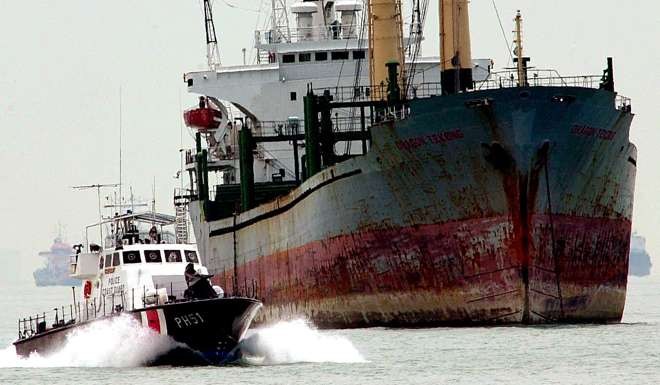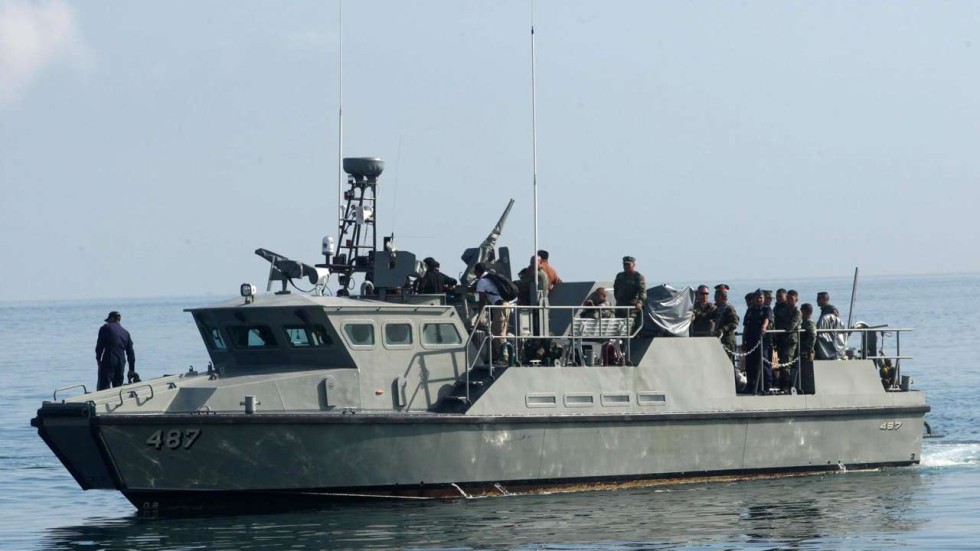Region of concern south of the Philippines is well away from disputed areas of South China Sea
Duterte said earlier in a speech to newly promoted Filipino generals that he had asked China to “patrol the international waters without necessarily intruding into the territorial waters of countries” in the southern waters of the island country in response to abducting sailors and attacking vessels in waters off the southern Philippines.

An official talks to Glenn Alindajao, a Filipino crew member of the South Korea-registered carrier DongBang Giant 2, after he was freed by Abu Sayyaf militants in Sulu, southern Philippines on January 14 Photo: Reuters
ADVERTISEMENT

The request came after Abu Sayyaf, a small band of militants that has declared allegiance to the Islamic State group, began kidnapping sailors in waters between Malaysia, Indonesia and the Philippines last year, taking several dozen hostages and attacking cargo ships.
Following the deaths of 14 people in a night market bombing last September, Secretary of National Defence Delfin Lorenzana requested two to three speedboats, two drones, a batch of sniper rifles and explosive ordnance disposal robots from a US$14 million arms donation from China
Duterte signed US$13.5 billion worth of deals with President Xi Jinping during their meeting last October, which was seen as further evidence that the island country was distancing itself from its traditional defence ally the United States and growing closer to China despite their long-standing territorial disputes in the South China Sea.

A file photo of a Singapore coastguard vessel patrolling an anchorage close to Indonesia's Riau Island. Photo: AFP
Zhu Xin, associate professor at Beijing’s University of International Relations, believed China would again make a supportive gesture by agreeing to Duterte’s request.
“It is obvious that China feels positive about Duterte,” Zhu said. “Furthermore, China would probably consider the terrorist problem a regional one rather than only considering its relations with the Philippines.”
Zhu said China would face difficulties carrying out its One Belt, One Road initiative raised by Xi in 2013 to build a 21st-century Maritime Silk Road if it failed to step up efforts to halt the spread of the terrorist group.
Xu Liping, a researcher at the Chinese Academy of Social Sciences, shared the view that it was “highly possible” that China would respond positively to the deal as it had already cooperated with other Asian countries like Malaysia to fight terrorism.
“The area involved is not disputed territory involved in the South China Sea, so it will not be too sensitive having Chinese ships patrolling waters in the area,” Xu said.
“Fighting terrorism is different from other [political disputes], because many terrorist groups target the United States,” he said, adding that patrols by US vessels in the area had only attracted more terrorists to the region.

Philippine President Rodrigo Duterte visits a soldier wounded in a clash with Abu Sayyaf rebels, at a military hospital in Zamboanga city, southern Philippines, in December. Photo: EPA
The International Maritime Bureau said last month that the number of kidnappings at sea hit a 10-year high in 2016, with waters off the southern Philippines becoming increasingly dangerous.
Pirates were focusing more of their attacks on larger merchant ships near the Philippines, hoping for bigger ransom payments from kidnapping their crew, the head of a regional anti-piracy group said last month.



No comments:
Post a Comment
Note: Only a member of this blog may post a comment.